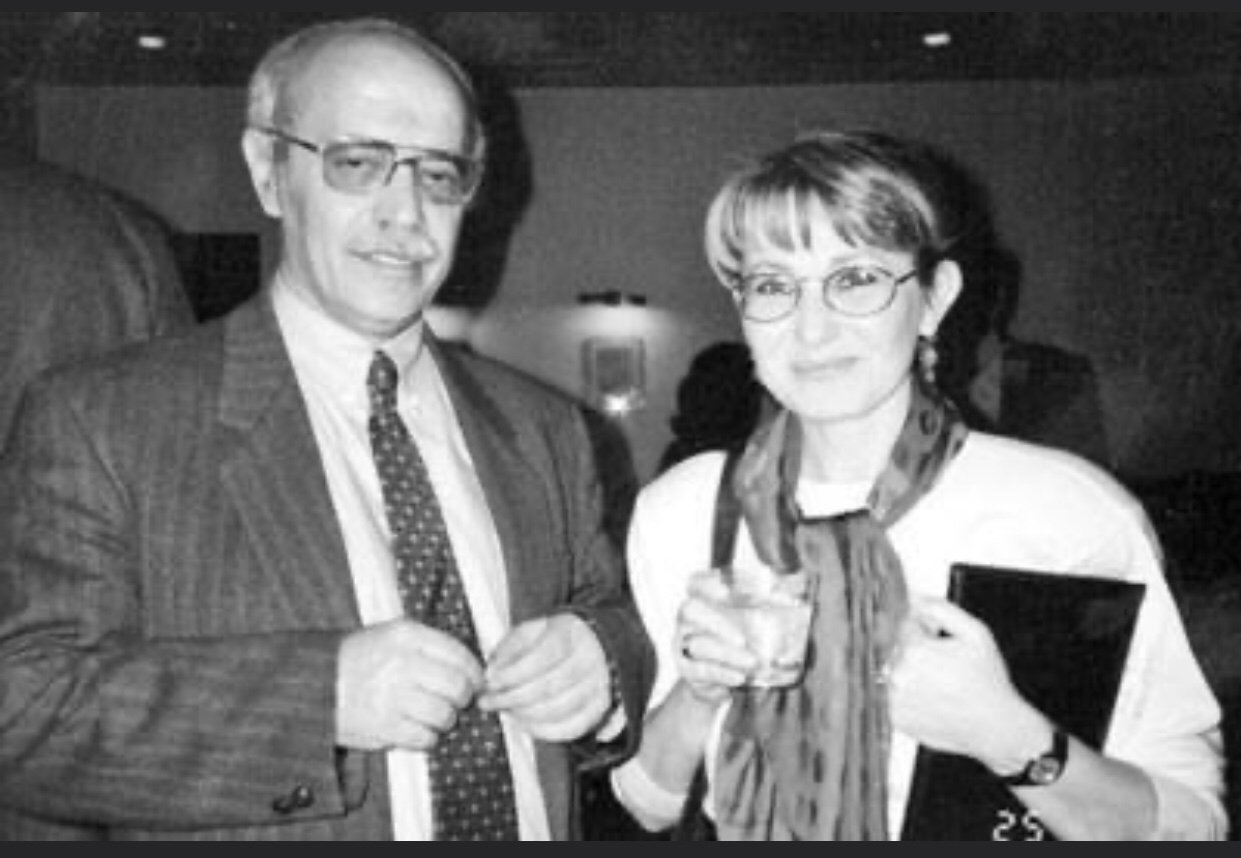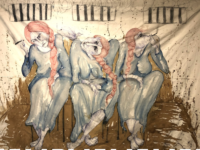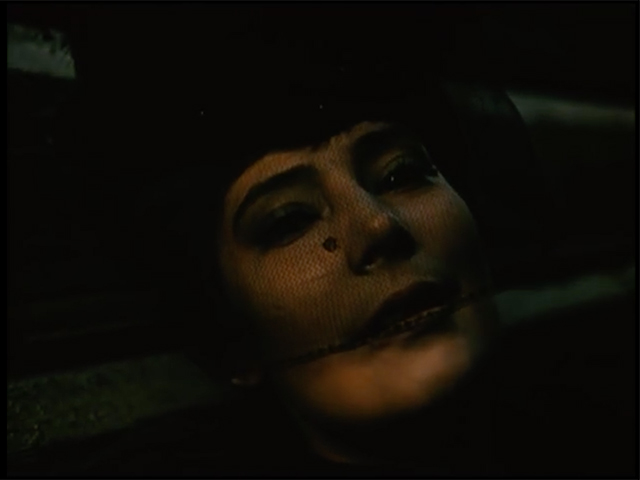It may not be widely known, but women have been in charge of big international film festivals only extremely rarely. The world’s leading festivals which have existed for more than 70 years – Cannes, Venice, and Berlin, known as the Big Three – are still to appoint a female head. In such context, the fact that the Istanbul International Film Festival was helmed by a woman, Hülya Uçansu, from its launch in 1982 up until 2006, is particularly special.
After retiring, she published a 400+ pages-long festival memoir, Bir Uzun Mesafe Festivalcisinin Anıları (Doğan Kitap, 2012). Now living in Bodrum, she continues her involvement with a variety of film festivals, not least the Flying Broom International Women’s Film Festival in Ankara.
Only a few women – with the exception of actresses –were present at the international film festivals scene in the 1980s. Hülya Uçansu was one of the female pioneers, who, alongside with Jeannette Hereniko of the Hawaii International Film Festivals’, Lia van Leer of the Jerusalem IFF’s, and Cinemaya’s publisher and NETPAK founder Aruna Vasudev, as well as Istanbul-born figures of the world of cinema, such as Beki Probst and Gönül Dönmez-Colin, shaped the world of festivals.
After Hülya’s retirement, another woman – Azize Tan – came to the directorship, and served in that capacity for another eleven years, up until 2015. This is an uncprecedented achievement for women in the world of film festivals at large.
I spoke to Hülya Uçansu earlier in 2022, as part of a large study of the global history of women and film festivals. And whilst I thought whe was careful and constrained in some of her responses, perhaps for PR considerations, I was amazed to learn from her about the now forgotten Balkan film festival from the 1970s or about her dealings with Andre Brisson, the powerful but universally disliked film bureaucrat – now justly forgotten – who ruled over FIAPF, the organisation that commanded festivals for nearly 35 years (1963-1998).
Tell me about your personal trajectory.
I was educated at the Austrian St. George’s Kolleg and then at the American Robert College, both in Istanbul. Thanks to this, I knew German and English from an early age. Then I earned a bachelor’s degree in English at Istanbul University.
At the age of 25, in 1975, whilst still a student, I took a part-time job at the Turkish Cinematheque. I was assistant to Onat Kutlar (1936-1995), its legendary founder and director. That encounter became a turning point in my life. After graduation, I continued working with Kutlar at the Istanbul Film and Production Center, which was now under the Ministry of Culture. My main task was organising the 3rd International Balkan Film Festival in 1979. After the military coup in 1980, the cinematheque was closed.
Following the example of the multi-art festivals in Venice and Edinburgh, the Istanbul Foundation for Culture and Arts (IFCA; Istanbul Kultur Sanat Vakfı-IKSV) acted as an umbrella institute organising art festivals in Turkey since 1972. Over the years, they run a classical music festival, a jazz festival, a theater festival and the Istanbul Biennial, all to high international standards.
Initially, in 1982, IFCA organised a trial film series limited to screenings seven films within the Arts Festival. As the pilot proved particularly successful, IFCA decided to pay more attention to cinema in their programmes. So the initial seven-film week became the first stepping stone to the film festival.
1983 saw the first Filmdays of Istanbul taking place. Onat Kutlar was invited to IFCA’s Board; his role was to oversee the preparations for an inaugural cinema event. As Kutlar had worked with me previously, he suggested to the Board that they invite me to join the directorate of Filmdays. This is how my career as Director of the film event in Istanbul was launched. I was 33 years old. I stayed in this position for twenty five years. In 2006 the Board decided that it was time for the old generation to hand over the batton to the younger one. This led to my retirement from the festival directorate. I was 56.
Who was on the team and how it evolved?
The initial team came together during 1982-1985 and was composed of five people. I was the one running all the administrative aspects as the executive director of the event and Vecdi Sayar (b 1950) was the artistic director who was putting the programme together and proposing it to the Committee for approval. The remaing three members were Onat Kutlar (who had founded and directed the Turkish Cinematheque (TC) for many years, Şakir Eczacıbaşı (1929-2010), who had close links to IFCA and had served as President of TC of the first 10 years, and Atilla Dorsay (b 1939), the country’s preeminent film critic. They were not just advisors but also involved hands-on whenever needed. We did not need other advisors as this Committee were the real advisors of the event anyway.

Onat Kutlar and Hülya Uçansu
All programming and the organisation were done in Istanbul. Besides me and Sayar, the only full-time festival employees, IFCA was paying an accountant who was in charge of the financial aspects, as well as a PR person responsible for ticket sales and protocol. Numerous young volunteers would join us three-four weeks before the festival started.
At the beginning the small staff was based in an apartment at the center of the city. In 1984 we moved to a bigger place on the premises of Yıldız Cultural and Arts Center (YCAC), which served as the headquarters of all IFCA festivals — and stayed here until December 1994.
How and when did you decide on the name of the festival?
The name Filmdays of Istanbul was picked in 1983. It was Vecdi Sayar, our programme advisor (and subsequently programme director) who proposed it. In 1988 wechanged to The International Istanbul Film Festival. We were reacting to rumors that Istanbul Municipality had decided to organise an international film festival – a move that could easily lead to complications and damage our reputation at the international circuit. So, as of 1988, our event came to be known as The International Istanbul Film Festival.
What were the main objectives and how did you go about achieving them?
In the early years of the festival, though I was the one working full time, there was also an Advisory Committee comprising of four other members. We worked together in defining the future artistic scope of the nascent festival. All members came from the previous Cinematheque team, such as its previous President, Director, Advisor, etc. Under the patronage of this Committe, it was decided that the goal of the festival will be first and foremost to present international films from around the world to Turkish audiences. The public was immensely enthusiastic, and Filmdays of Istanbul became a very special event, especially as it was taking place in a complex political context.
The second, equally significant aim of the festival was to present new films made in Turkey by up and coming talent to the international guests, which included directors from other festival, international film critics, as well as representatives of foreign film institutes who we managed to invite to Istanbul inspite of our very limited budget. Both goals were achieved soon, not least due to the enthusiasm of organisers and audience.
Besides the international and national competions, the programme included many sidebars, always a big retrospective, as well as three or four hommages dedicated to masters of cinema. We also run press conferences, Q&As and master-classes — these attracted mainly the young.
What was your international position?
We got official accreditation from FIAPF (the International Federation of Film Producers Associations which accredits festivals globally) after some years, in 1989. During that period, their director was Mr. André Brisson, a rather difficult person to collaborate with. Yet, I managed to handle him somehow. The Istanbul Film Festival was acknowledged officially by FIAPF as a B category festival, which, according to the regulations, meant we had to have a themed competition but did not have to program only premieres.
How was the competition put together, how many films competed, how were they judged?
In line with FIAPF’s requirement for a specialised theme, our international competition was focused on literary adaptations: the advisors only previewed such films in view to present a final line up of 12 to 15 films for approval to the Directorate. The films competed fort he Golden Tulip award. Jury members were recruited from various spheres of international cinema: film directors, actors, film critics, or representatives of film institutes. There were normally seven to nine jury members.
The films for the national competition were selected among recent outstanding products of Turkish cinema. This was an important part of our work as it was in Istanbul where the guests – festival directors of other big festivals – would first see the films and invite them to play internationally. The jury for the national competition was normally composed of four Turkish cineastes and one foreigner. Presenting the best of Turkish cinema to international professionals made the festival unique and was certainly one of the most important features of the event. The legendary Turkish hospitality and the beauty of Istanbul made it even more special.
How was the selection and programming done? What was your international involvement with other national institutes and festivals?
At the beginning the programming was done by Vecdi Sayar: He was the one visiting film festivals abroad and proposing themes to the Advisory Committee, which had the last say for all programming. As time went by, however, me and film critic Dorsay also started visiting festivals and proposing titles. So it became a team work, until 1991, when Sayar left the festival. From 1991 onwards I was officially appointed “Festival Director” and was responsible both administratively and artisticly.
During these travels, the official language would be English – and, as everybody on the team spoke good English, we could easily see subtitled films. In 1991 we started using electronic subtitles for those Turkish audiences who would have difficulties with foreign languages.
Every year Unifrance would invite me to Paris for some days so that I could see the French fims of the last season. There were also other national film institutions, like the Swedish Film Institute or Hungaro Film, or Istituto Luce in Italy, which all collaborated with us and facilitated the presentation of their films in Istanbul.
We had very good relations with all the embassies: They were supportive and efficient, and contributed a lot over the years. The engagement of the Italian Consulate in Istanbul in the early years was indeed unmatched. I developed good relations with various foreign festival directors, film critics and journalists. Like Guglielmo Biraghi of the Venice Mostra and his successor Gillo Pontecorvo. But also with Moritz de Hadeln of Berlinale, the Istanbul-born Beki Probst of the European Film Market in Berlin, as well as with Marco Müller of Rotterdam and Locarno.
Between 1987 and 2006, I served on many film festival juries abroad – both as a member and as a president. I served on juries at the festivals in Venice, San Sebastian, Rotterdam, Edinburgh, Rome, Valencia, and Montpellier.
Who were the people attending the festival?
Istanbul Film Festival has become ‘the festival of the country’ from day one. It was a real feast for all the film lovers of the city. It was attended mainly by the city’s big audience. They were immensely enthusiastic. In addition, cinephiles and film students would travel from other cities (like Ankara, İzmir, Eskişehir, Antalya). The international guests were invited to Istanbul mainly from Europe as our limited budget could cover only short-flight tickets.
Which media were covering the festival and how?
The Festival was covered by all leading newspapers and art magazines of the country. I am proud to say that also the international papers like Variety, Screen International, Moving Pictures, Sight and Sound also gave us coverage.
Who were the supporters and what kind of assistance was available to you?
We benefited from the sponsorship of a large variety of businesses, including the country’s banks. The Istanbul Stock Exchange was our main sponsor for about seven years. Turkish TV was also particularly supportive; every year they bought some of the foreign films from our programmes to show via their networks. Naturally, this was an incentive for international distributors who had interest in submitting their films to us.
Was there interference?
Yes, unfortunately there was severe interference into the content of the films by the official Censorship Committee in the period 1982-1988. In 1988 the Committee demanded cutting scenes and wanted to ban five films. This caused a big outcry and criticism in the press, both nationally and internationally. Taking that into consideration, the Minister of Culture passed a law cancelling the official control of the state on the international film programme in 1988.
What were your relations with other festivals in your country?
We always had amicable relations with other festivals in the country; they often picked films that had been part of our programme. We also collaborated with the National Cinema Institute as they were also functioning as the archive of the Turkish Cinema.
What archives are there of the festival, where are they kept and what arrangements for access exist?
An archive has been created within the IFCA foundation. Anybody who wants to reach photos or other relevant historical documents can Access it. It is being handled with professionalism.
Please click here for the Turkish translation of this interview.




